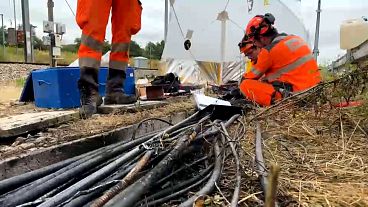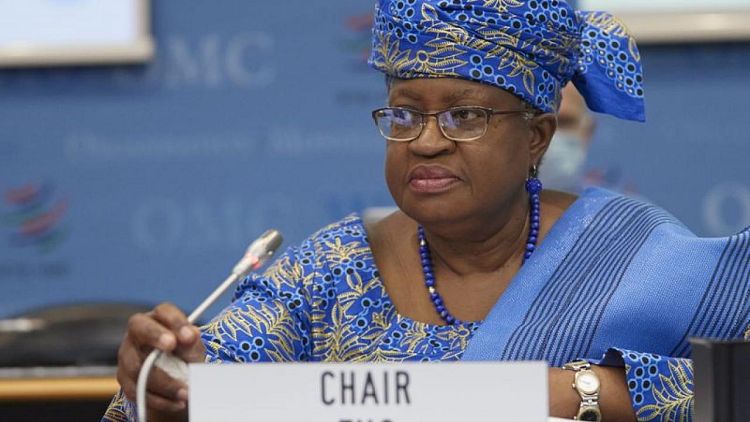GENEVA - Trade ministers are holding a conference at the World Trade Organization in Geneva for the first time in four years from Nov. 30-Dec. 3 at a critical juncture for the body.
Few expect a package of deals but Director-General Ngozi Okonjo-Iweala has said she is aiming for "at least one or two" concrete outcomes.
Here are the main topics:
PANDEMIC RESPONSE
Okonjo-Iweala has called vaccine inequity "unconscionable" and given top priority to a deal to facilitate the flow of drugs and spread vaccine more widely.
But members have been deadlocked for over a year on the main item under negotiation - a potential waiver of intellectual property (IP) rights for COVID-19 drugs and vaccines sought by proponents India and South Africa along with over 100 other WTO members.
Several wealthy countries oppose a broad waiver and say there are better ways to boost vaccine-sharing, using existing IP rules.
Since a waiver would require consensus from the WTO's 164 members, it is now widely seen as out of reach, although discussions on a compromise are continuing between the European Union and South Africa.
Countries are also working on a non-binding declaration on trade and health that would aim to reduce export restrictions on medical goods, among other things, but it has faced criticism from Washington and others, delegates say.
FISHING
These negotiations are aimed at removing subsidies that contribute to overfishing, a step that environmentalists say is important to help fish stocks recover. [L5N2NW6HM]
But talks have been going on for 20 years and attempts at a deal failed at the last ministerial meeting in Buenos Aires in 2017. WTO deputy head Xiangchen Zhang said the fisheries outcome would be a "critical test" of the WTO's credibility.
Considerable disagreements remain, including over the scale of exemptions for developing countries. Colombian chair Santiago Wills is seeking to prepare a "clean" draft agreement for ministers. However, the latest version on Nov. 8 contained 91 pairs of square brackets that indicate undecided areas.
India has been one of the biggest critics, with trade minister Piyush Goyal slamming part of the proposals as "unjust" and pushing for bigger carve-outs.
Negotiators hope China, the world's largest marine fishing nation and a major subsidiser, will agree to forego the special rights it could claim as a developing country.
TRADE IN SERVICES
A group of at least 65 countries are aiming to streamline services trade through a deal that would cut red tape. Costs for trade in services are about double those for goods due to differences in regulations and procedures.
Trade experts say that this is one area where an agreement is all but certain since ministers can simply rubber-stamp a pre-agreed deal on new sectors.
Because the deal is restricted to a small group, those outside the negotiations cannot wield a veto.
Some members such as India and South Africa oppose such 'plurilateral' discussions on legal grounds.
WTO REFORM
All WTO members say the 27-year-old organisation's rule book needs updating, although they disagree on how to do so.
Most pressingly, its dispute appeals court has been paralysed for nearly two years since then-U.S. president Donald Trump's blocked new adjudicator appointments, which has quelled the appetite to seek redress of trade disputes through the WTO.
Okonjo-Iweala is pushing for members to agree a roadmap for reforming the dispute settlement procedure at the meeting.
However, delegates there is little common ground, with some members wanting only small tweaks and others, such as the United States, seeking a broad overhaul of a system described by its top trade official Katherine Tai as "unwieldy and bureaucratic".
AGRICULTURE
A draft agreement will be submitted to ministers ahead of the conference, but one trade source said vast gaps remained on key areas, including the form and level of allowable subsidies.
Even a seemingly uncontroversial proposal to bar countries from restricting food aid deliveries has led to a wrangle.
ENVIRONMENT
Negotiations began in 2020 and are in a preliminary phase, but some experts think the environment has the potential to give the body a new vitality and purpose.
China and the United States joined the talks this month.
A roadmap set to be adopted at the meeting aims to advance negotiations, including in contentious areas such as fossil fuel subsidies following the submission of a phase-out proposal by New Zealand.
Most delegates see this as too ambitious but, if negotiations on cutting fisheries subsidies are successful, that could give environmental efforts some momentum.












